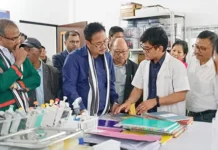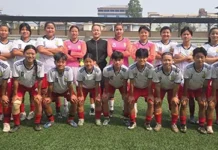SHILLONG (Meghalaya), Jan 29: The Impulse NGO Network (INGON) here has launched a project engaging the media to counter human trafficking in and between the borders of India, Bangladesh, Myanmar and Nepal.
The project, evolved out of recognition of the media’s important role in driving information on the complex issue, aims to bridge the gap between journalistic training and sensitization to human trafficking.
The INGON will partner with international media in the process to implement the Impulse Model Press Lab, building upon its collaborative relationships with the BBC, Thompson Reuters Foundation, France 2, CNN News 18, and the Sikkim Express, according to a press statement issued by the NGO.
The Impulse Model Press Lab will run a one-year fellowship programme for early-career journalists from India, Bangladesh, Nepal and Myanmar, who will receive training and mentorship to enhance their skills and understanding of human trafficking, and become sensitized to the experiences of victims and survivors. The fellowship will focus on trends driving increasing rates of human trafficking across the porous border countries – an issue that mars the region.
The project will also include a month-long fellowship for mid-career journalists from each country to conduct major in-depth reports on cross-border human trafficking in the neighbouring states.
An important feature of this initiative is that digital and social media will be harnessed to increase public understanding of the complex landscape of human trafficking while training journalists to accurately and sensitively report on the issue, and to uphold the privacy and dignity of victims and survivors, the release said.
A cross-functional team of core members drawn from various fields, including journalists, gender specialists, psychologists, legal experts, and country advisors to the INGON, will lead the three-year project.
The team convened for the first consultation on the Impulse Model Press Lab in Kathmandu, Nepal, on 11-12 January.
The Impulse Model Press Lab builds upon the INGON’s human trafficking prevention activities under the ‘Press Pillar’ of the Impulse Model, which trains journalists to report on human trafficking through a victim/survivor-based approach, and works with media partners to initiate awareness campaigns to galvanize policy actions.
The INGON aims to harness results from the Impulse Model Press Lab to bolster the accountability of governments’ anti-trafficking measures in the region, and collaborative efforts to prevent cross-border human trafficking.
An evaluation of the project will be conducted to assess the goals and outcomes at the end of its first year. The evaluation, involving all participants of the project activities, will be central to identifying key strengths and areas of improvement and deciding the future roadmap of the lab, the release added.


